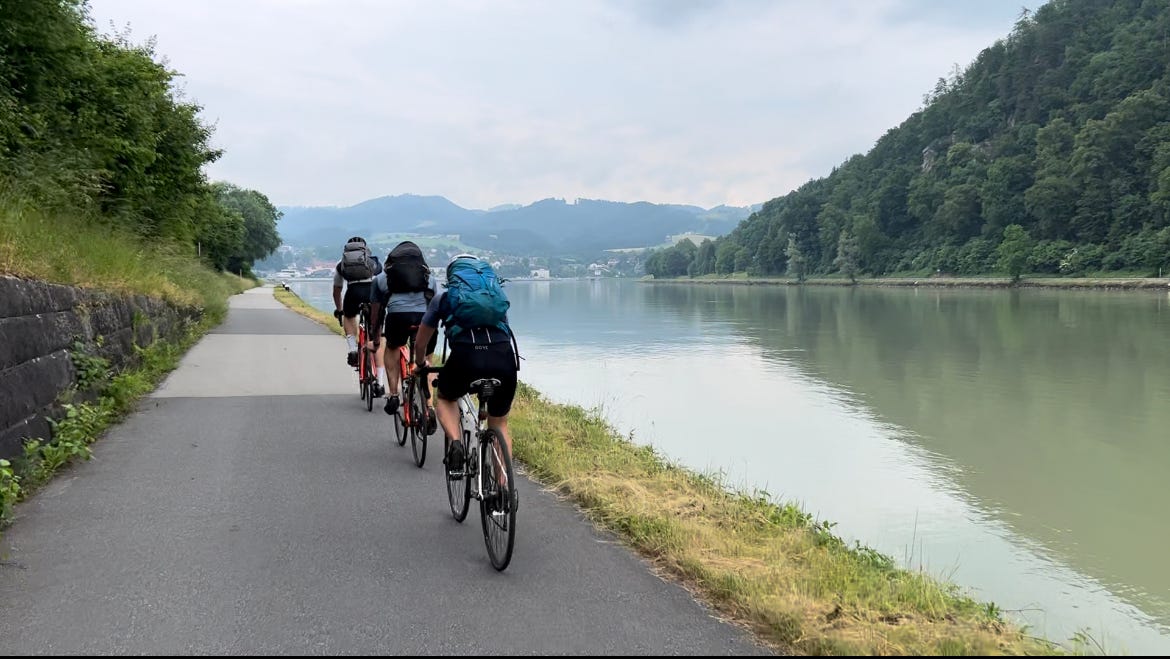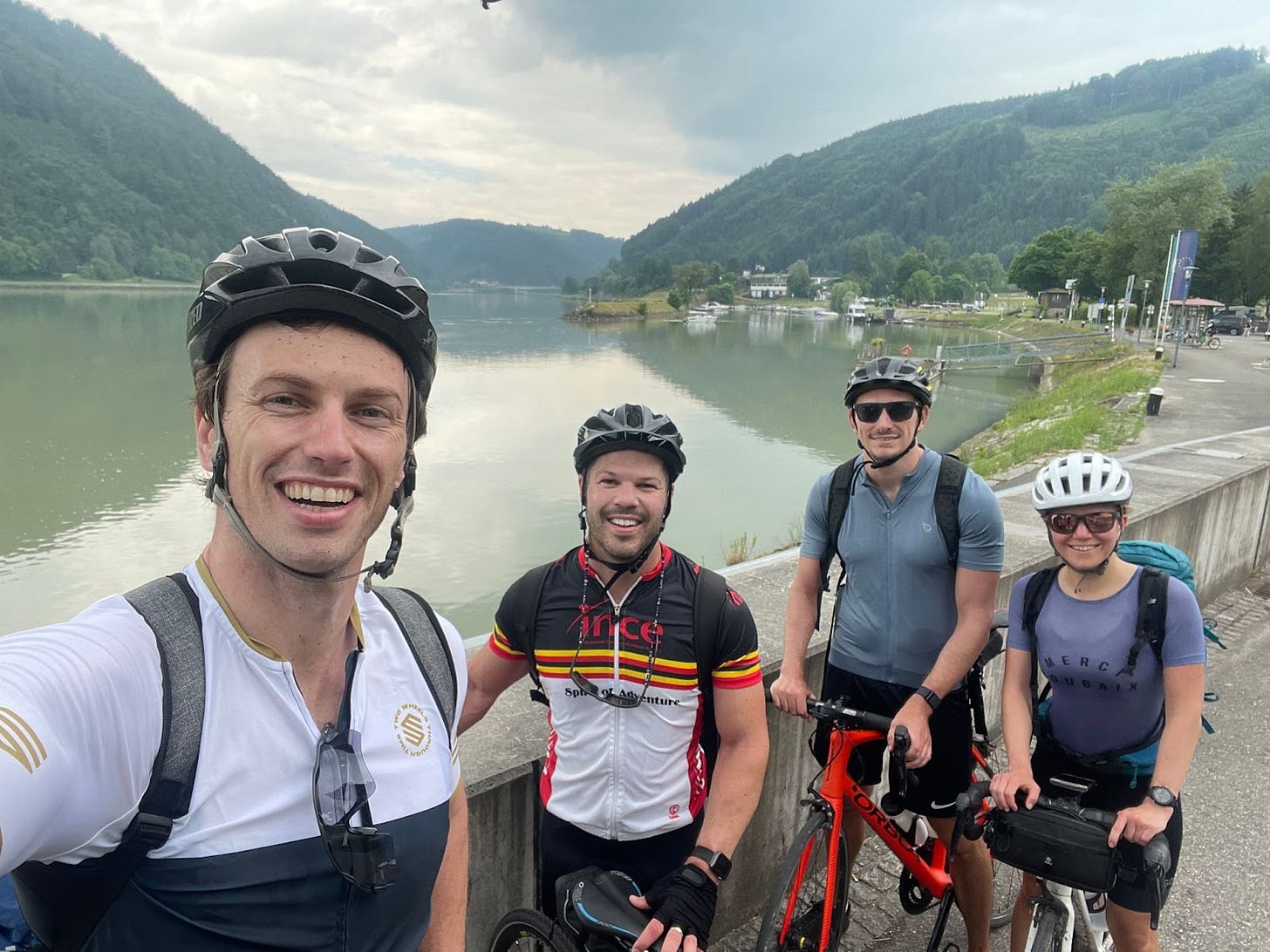3 Lessons From Cycling 330km in 3 Days
Today's edition is about letting the river guide you
Hey everyone 👋. I'm John. Welcome to Creators' Corner: a place where I share advice on creativity & mindset. Here's the previous edition of the newsletter if you missed it.
I just got back from an incredible cycling trip through Austria. Three friends and I rode along the Danube from Passau (western Germany) to Vienna over three days.
The trip was strenuous for the body, but relaxing for the mind. Exactly what I needed after a hard few months of work, mentoring and writing.
Highlights:
Kilometres covered: 330km
Energy gels gulped down: 2 per day
Overnight stops along the way: Passau -> Linz -> Melk -> Vienna
Ice creams devoured: 8
My biggest challenge: getting all my things in one tiny backpack
Photos taken: 285
Favourite sight: The Melk Abbey — an old Benedictine abbey built in 1089 on a rocky outcrop overlooking the Danube when Austria was still inhabited by barbarians. It is famous for its massive library full of ancient, medieval texts. In The Name of the Rose, Umberto Eco named one of the protagonists "Adso of Melk" as a tribute to the abbey and its library.
On the first day, I was still thinking about work, responsibilities and my writing (a constant companion). I had secretly been aiming to use the time on the bike to think about my next writing topic — my lessons from a Small Bet.
But the river kept pulling my mind towards it, making me reflect on the present moment — the sounds of my wheels touching the tarmac, the chirping of the birds and the glistening water.
As I was riding, I kept thinking about how lucky I was to be fit and healthy and how special it was to spend time in nature with friends.
Here are the lessons I want to share from the trip:
1/ Active holidays are my new favourite holidays
Active holidays are loads of fun. I'd love to do them more often.
Sitting in a bus with no roof between 30 passive tourists with dull eyes, cameras out, the city passing them by, just to move from buffet breakfast to organized tour to the next fancy Instagram hot spot… No thank you!
Take me outdoors. Add a challenge. Add some friends. That’s what I’m after.
These trips can be anything from a golf tour to completing a cross-Alpine hiking trek. Or a flyfishing expedition to rowing down a river sleeping next to the water’s edge each night.
You get to experience a new landscape from a totally new perspective. You get to form closer bonds with people. The best part is you get to push your own limits while you’re at it.
I’m already brainstorming my next activity-based holiday. I won't reveal it all here and now, but it will probably involve walking sticks, a rescue blanket and pre-saved GPS maps.
2/ Investing in your health is the best investment you can make
By taking care of your health and fitness, not only will you live longer (which is great), but you also get to do cool things for longer as you get older. By staying fit, your body will enable you to do activities instead of holding you back from enjoying them.
I’m not a pro cyclist (or a pro-anything for that matter). As far as exercise goes, I spend most of my time running or at the gym. I train six days a week to maintain a high level of base fitness.
So when I was asked to join the trip, I had no hesitation in saying yes. I backed myself to complete the 330km.
You don’t have to be a pro to enjoy a sport. You just need a basic level of skill and endurance. As Yvon Chouinard says in Let My People Go Surfing:
"I like to throw myself passionately into a sport or activity until I reach about an 80 percent proficiency level. To go beyond that requires an obsession and degree of specialization that doesn’t appeal to me."
You can get to 80% good at a sport in a short amount of time. To go from 80% to full-on mastery takes decades.
But here’s the kicker — you have the same amount of fun whether you’re an 80%-er or a master. You maximise the amount of fun for the time invested in learning a new sport (or any skill, activity or pastime).
3/ Happiness is only real when shared
I used to be a lone wolf. I trained alone and worked alone. This was a relic of being burned in group projects at school.
Over the last couple of years, I experienced the benefits of having a strong community. When I moved to Munich, I joined a running club which helped me integrate and make local friends. After I started writing, my writing friends provided the accountability and the feedback I needed to keep on publishing.
Instead of flying solo, I now realize the power of having friends and partners on the journey.
The same was true for our cycling trip.
Sometimes the group broke up when someone wanted to take a break or someone else wanted to push forward, but most of the time we rode in unison.
And each night we would sit together for our “fines” meeting - an opportunity to poke fun at each other in a good-natured way. We would order a couple of beers (we’re active, but we’re not saints) and recall funny stories and mishaps from the day. I got a bunch of fines for missing turn-offs, skipping kiosks and arriving late for kickoff. These daily roundups were my happiest moments on tour.
This reminded me of Christopher McCandless (also known as “Alexander Supertramp”) who scribbled the words:
“happiness only real when shared”
…above the Doctor Zhivago passage:
“And so it turned out that only a life similar to the life of those around us, merging with it without a ripple, is genuine life, and that an unshared happiness is not happiness…”
Here’s to many more happy miles and shared memories.
My Favourites
💬 Quote. Take a moment to be grateful:
“People complain about the bad things that happen to ‘em that they don’t deserve but they seldom mention the good. About what they done to deserve them things. I don’t recall that I ever give the good Lord all that much cause to smile on me. But he did.” – Cormac McCarthy, No Country for Old Men
✍️ Essay. How to Be Great by Steph Smith. Steph suggests that to be great you just have to be good, consistently. Consistency is the hardest thing. If you keep publishing and keep sharing your ideas, you’ll build up credibility and confidence. As she says:
The first step in becoming great is recognizing that you’re likely not already great. In fact, it comes from recognizing that there is no such thing as greatness at a specific instance in time. Greatness is instead a reflection of a period of effort, since greatness in a single instance can be reduced to luck. Moreover, being “great” is not about being better than someone else. It is about being dependable and disciplined, and ultimately it is earned.
🐦 Tweet. The most important lesson David Senra (Founders podcast) learned from having lunch with Sam Zell.
I often struggle with balancing freedom (upside, but higher risk) and stability (income and safety). By zooming out and looking at things in the long run, Sam suggests it doesn’t have to be one or the other.
Until next time, happy creating!
– John
👋 Thanks so much for being a subscriber. We're up to 340 creators this week. Please reach out if you have any thoughts or ideas. I'd love to hear from you.
💌 If you’d like to support my journey, the best ways are to:
Grab one of my digital products. Procreate for Writers is a 60-minute video course that helps you create visuals that grab your readers’ attention. Run Your Newsletter Like a Restaurant is a Notion dashboard that enables you to capture your best ideas & the best content you consume.
Share my newsletter with a friend. They can sign up below:







Great essay John. Brought back fond memories of visiting Melk on the road between Vienna and Salzburg (but I must admit, I was driving a car.) The quote from Cormac McCarthy is beautiful and timely as he died yesterday. I am inspired by your consistency at both writing and training.
John - I loved every bit of this! So glad you weren’t there last Friday so we could see pictures of where you were!